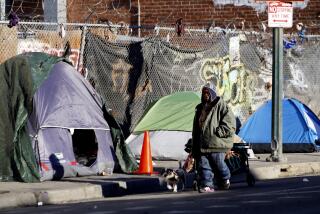Number of Massachusetts Elderly Poor Soars as They Live Longer, Exhaust Funds
- Share via
BOSTON — A rise in the number of poor senior citizens in Massachusetts indicates that as many people live longer, they are exhausting their finances, advocates for the elderly say.
“People who thought they would live comfortably are finding that their resources just are not lasting,” said Elsie Frank, president of the Massachusetts Assn. of Older Americans. “It’s kind of a frantic situation.”
The number of poor senior citizens in the state rose 10.8% during the 1980s, while the number of elderly poor declined nationally, according to a study by the Gerontology Institute at the University of Massachusetts-Boston.
The study, based on U.S. Census data, found that the number of poor senior citizens rose from 65,000 to 72,000 from 1979 to 1989 in Massachusetts. The poverty rate among the elderly remained constant at 9.4% as the number of elderly overall increased statewide.
Nationally, the number of poor people 65 or older declined, and the poverty rate among the elderly dropped from 15.2% to 11.4%.
Scott Bass, director of the institute, said the increase in Massachusetts came at a time when the state was experiencing an economic boom.
Now, he said, times are especially hard for the elderly as the economy sputters and government aid, such as the fuel assistance program, dwindles.
“Poverty among the elderly doesn’t lend itself to easy solutions,” Bass said. “Older people don’t have the same ability to pull themselves up, and without government intervention they have few options.”
Among the study’s other findings:
* Women over 75 had the state’s highest poverty rate--14.9%.
* Sixty-two percent of all older women in Massachusetts had incomes of less than $10,000 in 1989.
* Only 4% of elderly people statewide were receiving public assistance in 1989, down 10% from 1979.
* The number of people over 65 in Massachusetts who were employed dropped 16% in the 1980s.
* About a third of all people over 65 in the state had income from pensions in 1989.
Although people over 85 represent the fastest-growing segment of the population, poor elderly people often go unseen, Bass said.
“They could be living in a house that’s fully paid for, but they’ve depleted their assets,” Bass said. “You might not think of that person as poor. It’s a more hidden problem.”
Frank attributed poverty among the elderly to Massachusetts’ high living costs and to the rising cost of health care and drugs.
More to Read
Sign up for Essential California
The most important California stories and recommendations in your inbox every morning.
You may occasionally receive promotional content from the Los Angeles Times.











